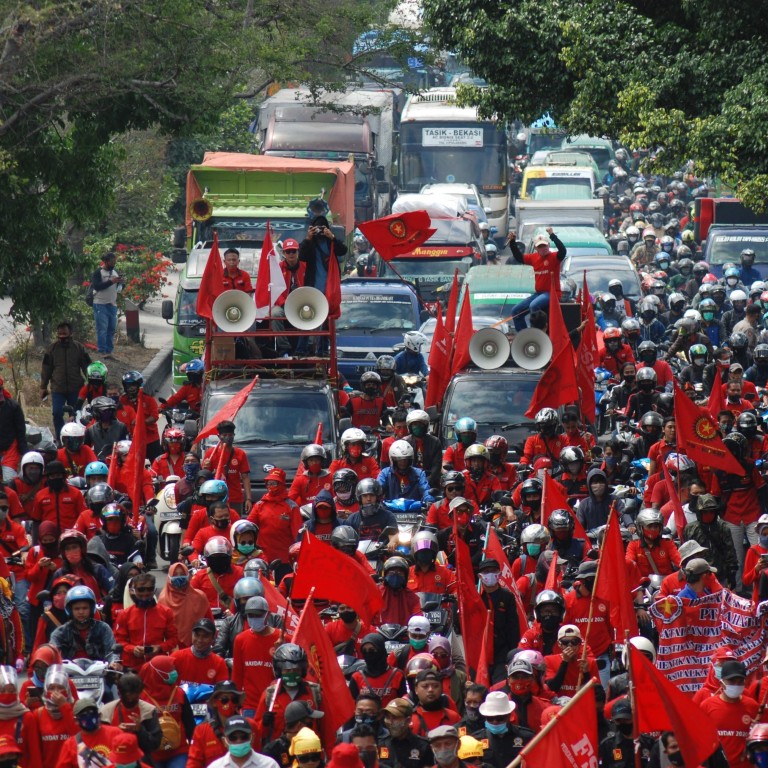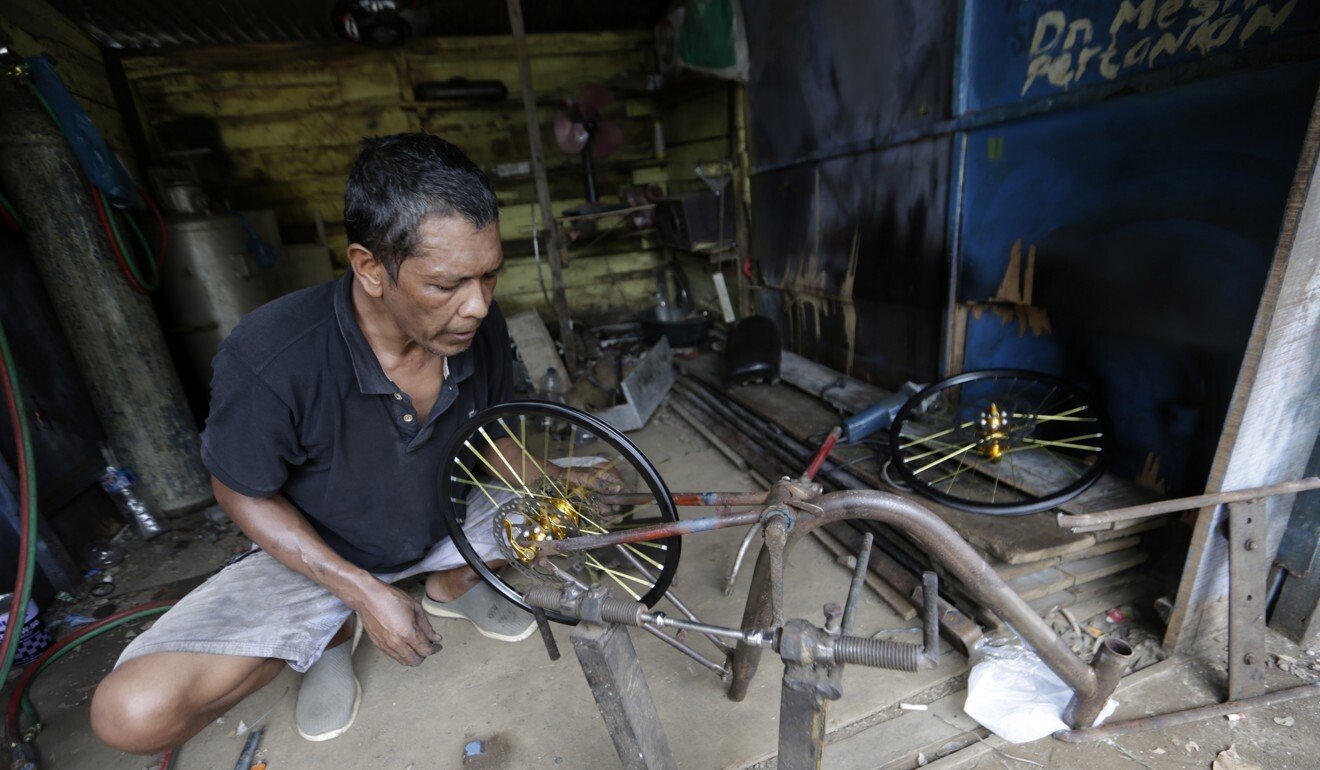
Omnibus Law: Indonesian police launch ‘cyber patrols’ as protesters coordinate mass action
- Three days of planned protests against the controversial law began on Tuesday, even as the country struggles to get Covid-19 under control
- Police directives include mandates to launch social media ‘cyber patrols’, ‘counter-narratives’ to stop millions of protesters from mobilising across country
Late last week, the Indonesian National Police issued an internal notice to regional departments containing directives on how to control the planned street protests, which are seeking to mobilise millions of people and are taking place across 25 provinces in Southeast Asia’s largest economy.
The law would make it easier for companies to secure permits for mining and building projects and exempts some firms from dividend taxes, but critics assailed it for removing a rule where the government has to consider the inflation rate in determining the minimum wage. This, they fear, will lead to much lower real wages for workers. Amnesty International Indonesia called the law “catastrophic”, and said it would “harm workers’ wallets, job security and their human rights as a whole”.
Why are Indonesians protesting the ‘job-creating’ Omnibus Law?
Argo did not respond to text messages and calls from This Week in Asia seeking elaboration on how the police would carry out the directives.
Kahar Cahyono, the communications head of the Indonesian Trade Union Confederation (KSPI), said a letter circulated on WhatsApp claiming the mass strikes had been cancelled was a hoax. The KSPI is one of the country’s largest labour groups and a major backer of the protests.
Television footage from the national media group Kompas showed thousands of people protesting in Bandung, West Java, on Tuesday, wearing face masks but without observing social distancing. Police blocked protesters from going to the parliament building in Jakarta, citing the need to contain the virus.

Ika Ningtyas, head of the freedom of speech division at the Indonesia-based group Southeast Asia Freedom of Expression Network (SAFEnet), said in the past two days that there had been a deluge of social media accounts seeking to paint the legislation, known as the Omnibus Law, in a positive light.
In August, 22 celebrities and social-media influencers were paid to promote the bill through the hashtag #IndonesiaButuhKerja or #IndonesiaNeedsJobs. Several of them later apologised for doing so, saying they were unaware it would negatively affect workers’ wages.
The government has never admitted it paid influencers to promote the bill, although it has admitted to paying influencers to promote certain policies.
Ika said the police directives reflected a growing trend of authorities and politicians in Southeast Asia going online to assert control over their citizens’ rights to self-expression while also trying to influence public opinion through legitimate means.
Can Jakarta get its raging Covid-19 outbreak under control?
“What’s happening in the Philippines is not as massive as what’s happening in Indonesia,” she said. “But basically the countries are just copying from each other.”
While trolls and buzzers – anonymous cyber troops known for spreading hoaxes – have featured prominently in previous election campaigns in both countries, Jaleswari Pramodhawardani, a senior official in the Executive Office of the President, told local media that the Indonesian government had not engaged in such activities, but had only used social media influencers to promote its policies.
According to Indonesia Corruption Watch, the government has, over the past three years, commissioned “influencers” or “key opinion leaders” – in the terminology of official government procurement documents – to the tune of 90 billion rupiah (US$6 million).
Meanwhile, Indonesians have continued to rally online for the bill to be overturned, with at least 24,000 people signing a petition. K-pop fans in Indonesia have also begun to protest against the bill, similar to how they were a political force on the internet several months ago when they called attention to the Black Lives Matter movement.
Women held in Malaysia insist they are ‘royals from Sunda Empire’
The number one trending topic on Twitter in Indonesia on Tuesday afternoon was #OmnibusLawSampah or “OmnibusLaw is trash”. “Sunda Empire” also became a trending topic on Twitter after Indonesian netizens dismayed with the bill suggested joining a fictitious kingdom in Central Java.
Activists such as Lini Zurlia said Indonesians would not shy away from physical protests, despite the country continuing to battle rising coronavirus cases – it has 307,000 cases and 11,253 deaths, the highest death toll in Southeast Asia. KSPI secretary general Riden Hatam Aziz said 5 million workers would join the mass action over the next three days, with 2 million of them in Greater Jakarta.
Eka Ginanjar, head of the health protocol division of the risk mitigation team at the Indonesian Medical Association said: “If hundreds or even thousands of people have gathered, it will be very difficult to enforce the health protocol. Especially with the atmosphere of the demonstrations, where people tend to shout their aspirations, this will make people neglect to wear their masks,”
On top of mass rallies, campaigning for regional elections in December is also taking place.
“These two things can be predicted to be the cause of the explosion in the number of Covid-19 cases going forward. I can only pray that this doesn‘t happen,” Ginanjar said.
Additional reporting by Reuters

